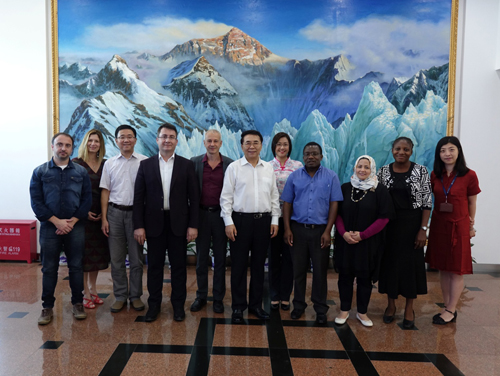The Executive Committee of TWAS Young Affiliates Network (TYAN) held its second meeting in the Institute of Microbiology, Chinese Academy of Sciences (CAS) in June 12-16, 2017, in Beijing.
During the meeting, the TYAN Executive Committee members discussed TYAN development strategies, collaborations among Young Affiliates, and the detailed plans for the first TYAN International Conference to be held in Rio de Janeiro, Brazil, in the coming August.
Prof. BAI Chunli, President of TWAS and the Chinese Academy of Sciences hosted a meeting with the TYAN Executive Committee members on June 14, while Prof. LI Yin, on behalf of TYAN Executive Committee, presented the recent progress of TYAN's work. Dr. Massimo Paoli, TWAS Programme Coordinator, also participated in this meeting.
Prof. BAI Chunli appreciated the efforts made by TYAN Executive Committee and the development of TYAN. “TYAN is an innovative initiative in promoting the development of TWAS Young Affiliates, and will play an important role in future growth of TWAS,” he said. He also advised that TYAN should develop into a network delivering effective collaborations in science & technology, and develop partnerships with research organizations in developed countries to promote south-north cooperation.
The program of TWAS Young Affiliates was started in 2007. Every year, 25 young scientists will be selected as Young Affiliates from the 5 regions of TWAS. TYAN, sponsored by Lenovo, was founded in 2016. The first Executive Committee of TYAN includes 8 members from China, Malaysia, Brazil, Argentina, Turkey, Tunisia, Nigeria, and South Africa.
More than 70 Young Affiliates have been actively involved in the discussion and development of TYAN since its foundation last year. For the first time, TWAS Young Affiliates have their own platform to discuss how to advance the developing countries through scientific collaborations.

BAI Chunli, TWAS President meets Executive Committee members of TYAN
From left to right:
Franco Martin Cabrerizo (Argentina); Patricia Zancan (Brazil); LI Yin (China); Yusuf Baran (Turkey); Massimo Paoli; BAI Chunli; Sok Ching Cheong (Malaysia); Collet Dandara (South Africa); Jalila Ben Salah-Abbas (Tunisia); Bolanle Ade Ojokoh (Nigeria); FENG Kai (ROSEAEP, Beijing)
